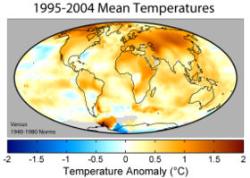Global Warming.
By CodyWilliams
@CodyWilliams (142)
United States
November 14, 2006 12:00am CST
Discuss. What do you know about it? What would you like to know about it?
2 responses
@jennp204 (231)
• Canada
14 Nov 06
I know it is selfish think of the polar bears yadda yadda yadda, but I am all for global warming to an extent. It gets dang cold up here in Canada, and any helping hand I get in keeping warm during the winter is much appreciated. the warmest its gona get here all week is 42 F and that is tomorrow, lately it has been around 20 F. too friggin cold. If they are worried about the ice caps melting, then they can send some ice up with the next group of astronauts to the moon or something. Then that way it won't melt and flood california, or florida.
That's my opinion
@CodyWilliams (142)
• United States
18 Nov 06
I'd like to be the creator of a space ship capable of carrying an iceberg :-)
@zubair439 (3183)
• India
18 Nov 06
Global warming is the observed increase in the average temperature of the Earth's atmosphere and oceans in recent decades.
The Earth's average near-surface atmospheric temperature rose 0.6 ± 0.2 °Celsius (1.1 ± 0.4 °Fahrenheit) in the 20th century. The prevailing scientific opinion on climate change is that "most of the warming observed over the last 50 years is attributable to human activities"[1].
The increased amounts of carbon dioxide (CO2) and other greenhouse gases (GHGs) are the primary causes of the human-induced component of warming[2]. They are released by the burning of fossil fuels, land clearing and agriculture, etc. and lead to an increase in the greenhouse effect. The first speculation that a greenhouse effect might occur was by the Swedish chemist Svante Arrhenius in 1897, although it did not become a topic of popular debate until some 90 years later.[3]The measure of the response to increased GHGs, and other anthropogenic and natural climate forcings, is climate sensitivity. It is found by observational[4] and model studies. This sensitivity is usually expressed in terms of the temperature response expected from a doubling of CO2 in the atmosphere. The current literature estimates sensitivity in the range 1.5–4.5 °C (2.7–8.1 °F). Models referenced by the Intergovernmental Panel on Climate Change (IPCC) project that global temperatures might increase between 1.4 and 5.8 °C (2.5 to 10.5 °F) between 1990 and 2100. The uncertainty in this range results from both the difficulty of estimating the volume of future greenhouse gas emissions and uncertainty about climate sensitivity.
An increase in global temperatures can in turn cause other changes, including a rising sea level and changes in the amount and pattern of precipitation. These changes may increase the frequency and intensity of extreme weather events, such as floods, droughts, heat waves, hurricanes, and tornados. Other consequences include higher or lower agricultural yields, glacial retreat, reduced summer stream flows, species extinctions and increases in the ranges of disease vectors. Warming is expected to affect the number and magnitude of these events; however, it is difficult to connect particular events to global warming. Although most studies focus on the period up to 2100, warming (and sea level rise due to thermal expansion) is expected to continue past then, since CO2 has an estimated atmospheric lifetime of 50 to 200 years.[5]. Only a small minority of climate scientists discount the role that humanity's actions have played in recent warming. However, the uncertainty is more significant regarding how much climate change should be expected in the future, and there is a hotly contested political and public debate over what, if anything, should be done to reduce or reverse future warming, and how to deal with the predicted consequences.
----------------------------
causes---------
The climate system varies both through natural, "internal" processes as well as in response to variations in external "forcing" from both human and non-human causes, including solar activity, volcanic emissions, and greenhouse gases. Climatologists agree that the earth has warmed recently. The detailed causes of this change remain an active field of research, but the scientific consensus identifies greenhouse gases as the primary cause of the recent warming. Outside of the scientific community, however, this conclusion can be controversial.
Adding carbon dioxide (CO2) or methane (CH4) to Earth's atmosphere, with no other changes, will make the planet's surface warmer; greenhouse gases create a natural greenhouse effect without which temperatures on Earth would be an estimated 30 °C (54 °F) lower, and the Earth uninhabitable. It is therefore not correct to say that there is a debate between those who "believe in" and "oppose" the theory that adding carbon dioxide or methane to the Earth's atmosphere will, absent any mitigating actions or effects, result in warmer surface temperatures on Earth. Rather, the debate is about what the net effect of the addition of carbon dioxide and methane will be, when allowing for compounding or mitigating factors.
One example of an important feedback process is ice-albedo feedback. The increased CO2 in the atmosphere warms the Earth's surface and leads to melting of ice near the poles. As the ice melts, land or open water takes its place. Both land and open water are less reflective than ice, and so absorb more solar radiation. This causes more warming, which in turn causes more melting, and the cycle continues.
Due to the thermal inertia of the earth's oceans and slow responses of other indirect effects, the Earth's current climate is not in equilibrium with the forcing imposed by increased greenhouse gases. Climate commitment studies indicate that, even if greenhouse gases were stabilized at present day levels, a further warming of perhaps 0.5 °C to 1.0 °C (0.9–1.8 °F) would still occur.







